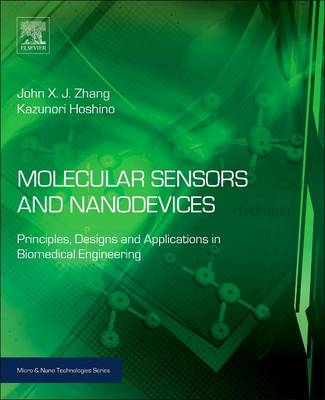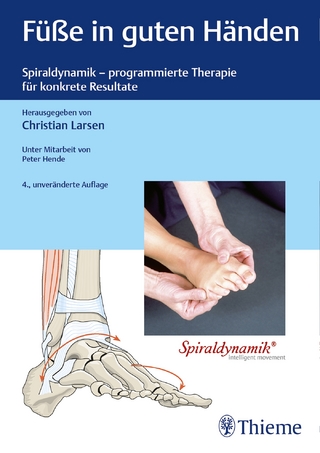
Molecular Sensors and Nanodevices
William Andrew Publishing (Verlag)
978-0-12-810169-8 (ISBN)
- Titel erscheint in neuer Auflage
- Artikel merken
The book is aimed at a broad audience of engineering professionals, life scientists and students working in the multidisciplinary area of biomedical engineering. It explains essential principles of electrical, chemical, optical and mechanical engineering as well as biomedical science, intended for readers with a variety of scientific backgrounds. In addition, it will be valuable for medical professionals and researchers. An online tutorial developed by the authors provides learning reinforcement for students and professionals alike.
Xiaojing(John) Zhang is an Associate Professor in the Department of Biomedical Engineering at the University of Texas of Austin (UT Austin). He received his Ph.D. from Stanford University, California, and was a Research Scientist at Massachusetts Institute of Technology (MIT) before joining the faculty at UT Austin. Dr. Zhang's research focuses on integrating Micro-electro-mechanical Systems (MEMS), nano-materials, micro-imaging and biosensors to provide innovative solutions to critical healthcare issues. Dr. Zhang has actively engaged in teaching new concepts and methods in these emerging biomedical engineering frontiers and has demonstrated innovation and excellence in engineering education. The materials presented in this textbook are based on his lecture notes while teaching a popular course on molecular sensors and nanodevices at UT Austin for the past 8 years. He has a track record for developing both core and emerging engineering curriculum along with developing well-funded research programs with fellow students. Among his numerous awards, Dr. Zhang received the Wallace H. Coulter Foundation Early Career Award in Biomedical Engineering, NSF CAREER award, DARPA Young Faculty Award among many others. To recognize his accomplishment in research and education, Dr. Zhang was selected to attend the prestigious US National Academy of Engineering, Frontiers of Engineering (NAE FOE) program in 2011, the NAE Frontiers of Engineering Education (NAE FOEE) program in 2012, and subsequently China-America Frontiers of Engineering Symposium (CAFOE) program in 2013. As an active member in his professional community, Dr. Zhang has served on numerous international conference organizing committees and editorial boards. He is an editor for ASME/IEEE Journal of Microelectromechanical Systems (JMEMS) and an associate editor Biomedical Microdevices. Kazunori Hoshino received his PhD degree in mechanical engineering from the University of Tokyo, Tokyo, Japan, in 2000. He worked for the University of Tokyo from 2003 to 2006 as a lecturer in the Department of Mechano-Informatics, School of Information Science and Technology, where he conducted several government funded project as the principal investigator. In 2006, he joined the University of Texas at Austin, where he works as a Senior Research Associate in the Department of Biomedical Engineering. His research interests are (1) NEMS/MEMS-based nanophotonic sensing and imaging systems and (2) microfluidic detection, imaging, and analysis of cancer cells. He has more than 100 peer reviewed publications in top international journals and conferences in the field of sensors, micro-electro-mechanical system (MEMS), and micro total analytical systems (TAS). He is the inventor of 6 issued US patents and 12 issued Japanese patents. The courses he has taught at the University of Tokyo and the University of Texas at Austin include: molecular sensors and nanodevices, intelligent micro-electro-mechanical systems, digital control systems, and engineering mathematics.
1. Introduction to Molecular Sensors Introduction 2. Fundamentals of Nano/Microfabrication and Scale Effect 3. Microfluidics basics and total analytical systems 4. Electrical transducers: electrochemical sensors and FET-based molecular sensors 5. Optical transducers: optical molecular sensors and optical spectroscopy 6. Mechanical transducers: cantilevers, acoustic wave sensors and thermal sensors 7. Implantable sensors
| Erscheinungsdatum | 05.11.2017 |
|---|---|
| Reihe/Serie | Micro & Nano Technologies |
| Verlagsort | Norwich |
| Sprache | englisch |
| Maße | 191 x 235 mm |
| Themenwelt | Medizin / Pharmazie ► Physiotherapie / Ergotherapie ► Orthopädie |
| Technik ► Elektrotechnik / Energietechnik | |
| Technik ► Medizintechnik | |
| Technik ► Umwelttechnik / Biotechnologie | |
| ISBN-10 | 0-12-810169-5 / 0128101695 |
| ISBN-13 | 978-0-12-810169-8 / 9780128101698 |
| Zustand | Neuware |
| Haben Sie eine Frage zum Produkt? |
aus dem Bereich



